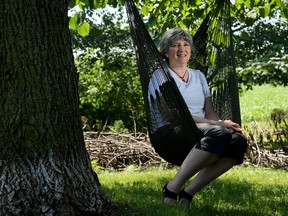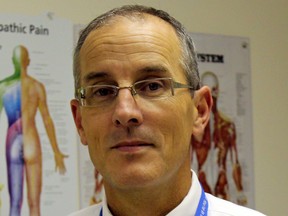"The devastation that these individuals are causing at the height of their lives is extraordinary."

In her past life, exercises are almost funny. was. I stood up from my chair, sat down again, stretched, and lifted a lightweight object. But it was before COVID-19.
Today, these exercises are a challenge for many patients participating in the groundbreaking post-COVID rehabilitation program at Ottawa Hospital. Long COVID. Currently, they are having a hard time completing basic tasks. And there are more people like them waiting for help.
This program, which provides physical, psychological and social support and skills to people with long COVIDs, cannot keep up with demand.
And even though researchers are beginning to understand the causes of long COVIDs, their demand is expected to increase.
People who participated in a small group of virtual programs over a week say it was a game changer. Not because it cures them, but because it gives them the tools to deal with them and helps them understand that they are not alone.
"I didn't have much hope that this rehab would fix me," said 50-year-old Kerri-Lynn Herbert. "For me, it was to make sure I wasn't alone."
Most participants had relatively mild cases of COVID-19, but protracted sequelae are commonplace. It was so serious that it affected my ability to function in my life and work. The most common symptoms among participants are extreme fatigue, cognitive impairment such as brain fog, shortness of breath, anxiety, fear, and chest tension that are exacerbated by too much activity.
Needless to say, some of the important lessons of the program include acceptance and learning at your own pace. If the COVID is long, pacing is everything.
Unlike other health problems that require rehabilitation, too much activity can have serious adverse effects on many long COVID patients. One participant talked about taking a shower and dressing up for dinner with a friend after she felt she could do it. After a night of blessing how well she looked, she spent the next two weeks in bed and recovered.
"The devastation that these individuals are causing at the height of their lives is extraordinary," said Wendilla Franboise, a nurse practitioner who coordinates the program.
Since starting as a pilot last year, 41 patients have undergone a pioneering hospital rehabilitation program. There are another 53 people waiting to enter, but that's just the tip of the iceberg.
Given the number of Ottawa inhabitants with COVIDs, Laframboise says there are probably thousands of people in cities with some long COVIDs. Many are health care workers and are infected with COVID-19 at a higher rate than in other societies through pandemics.

Dr. Shawn Marshall, Head of Physical Medicine and Rehabilitation Department at University Ottawa and Ottawa Hospital And while the program is funded by existing funds, it requires direct funding to meet the needs of patients.
"This is affecting people's lives," he said. "These people are very much affected."
Many experts have long said that COVID can overwhelm the healthcare system and have a serious impact on society. I'm worried. Some people recover completely, while others cannot regain their previous physical abilities.
Long COVID is characterized by a variety of symptoms, including shortness of breath, malaise, headache, brain fog, and other neurological problems, which can last for months or more after the diagnosis of COVID-19. ..
According to calculations such as the COVID-19 Science Advisory Table in Ontario, 10-30% of people infected with COVID develop long COVID.
Research emphasizes how catastrophic COVID can be, but it is also beginning to provide hope.
A Canadian study published last week identified microscopic abnormalities that affect the exchange of oxygen from the lungs to red blood cells in people with long COVIDs. Findings may pave the way for treatment.
Recent studies have also pointed out that people who test positive for COVID-19 are at increased risk of neurodegenerative diseases such as Alzheimer's disease and Parkinson's disease.
It is unclear what that means to the individual until treatment is given. Some return to work and return to the health and energy baseline, while others live with long-term changes in health and abilities.
Participant Monique Stone considers himself lucky in many ways. The 51-year-old Anglican priest in Julian, Norwich Church on Meribert Road, was able to get back to work at a different pace than before COVID-19.
"I can do what I need. My workplace allows me to adapt. If I worked at Tim Hortons Or if you were a nurse who worked in shifts for 12 hours, there's no way to do that, you can't even imagine, "Stone said.
Her symptoms include shortness of breath, brain fog, and fatigue.
Her rehabilitation program asserted for her: She talks about adapting to new realities and new limits as the components of her rehabilitation.
Stone tested positive for COVID-19 in January 2021. The acute phase of her illness was not severe.
She said, "To be honest, this wasn't the worst illness in my life, it was like a terrible cold."
But she never recovers completely. was. Then, about a month after her test was positive, she began to experience a level of fatigue she had never felt before.
"It was almost a lack of surreal energy and a lack of ability to do anything." She took a month off from her job and couldn't do much. She said she "defeated me" as she roamed the grocery store. She learned to respect her limits.

Since then, the rehab program has helped her learn her own pace She is seeing improvements in time.
"My hope is to be able to manage well within some new boundaries. I think I'm pretty lucky. Compared to some people, I'm living a really good life, "Stone said.
One of the great benefits of the program for Stone and others is that it connects with others who have similar experiences.
"It was all about being part of this group. I feel better," said Herbert, who also completed the rehab program. "I don't feel like you're alone."
She and her group members are planning to meet in person for the first time this summer.
In the early stages of the pandemic, Herbert, then 49, did everything she could to avoid COVID-19 because she already had lung disease.
I thought, "If I get infected with COVID, I will probably die."
She survived when she and most of her family were infected with the virus in January 2021, but regaining her pre-COVID-19 energy and her health levels. There wasn't.
More than a year later, she lives with severe nerve pain, malaise, shortness of breath, and loss of smell.
She wants to return to her previous COVID, but the program provides support and tools to deal with her current state. Some of these tools provide a way to store energy when doing household chores such as cooking and cleaning.
The people participating in the program are physiotherapists and occupational therapists, psychologists, social workers, people with financial expertise, and people who can help return to work. Get help from a team of clinicians, including.
This program was launched at Ottawa Hospital in July 2021. This is partly based on the World Health Organization's recommendations for long-term COVID rehabilitation, Lafranboise said. The patient must be referred by a doctor.
Most participants in the program are women, with an average age of 44 years. Many are healthcare professionals or play a leading role in the work. La Fran Boise added that they often feel that they are irreversible, or at least not full-time, and are burdening their families. Patients who have experienced the
program have stated that they have better management of their symptoms and improved quality of life.
"It gives them hope. It gives them support."

Postmedia Network Inc. Sign up to receive daily headline news from one division, Ottawa Citizen.
Thank you for registering.
A welcome email has been sent. If you don't see it, check your junk folder.
The next issue of Ottawa Citizen Headline News will arrive in your inbox shortly.


